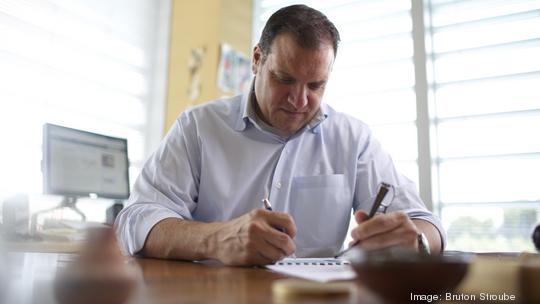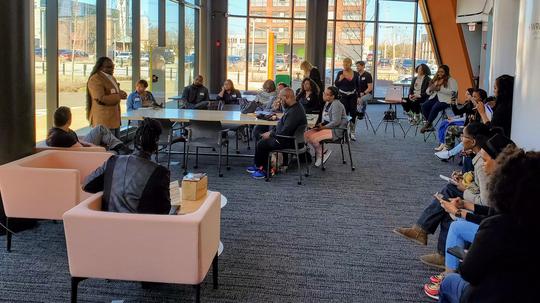
Sam Fiorello threw his 90-day plan into the outdoor firepit at the end of his first week on the job. The newly hired president and CEO of the Cortex Innovation Community began his role two weeks into a mandatory quarantine and global pandemic. This pandemic, and the community unrest following the killing of George Floyd, deeply shaped Fiorello’s first 17 months at Cortex.
Together with the board of directors and staff, Fiorello worked to create a new vision for Cortex; one grounded in people, inclusive economic impact, and more resilient to the impacts of pandemic. Recently, Fiorello sat down to reflect on the past 17 months and Cortex’s path ahead.
Q: In retrospect, how did you adjust your strategy to lead Cortex amidst a time of significant challenges?
The Covid-19 pandemic caused everyone to rethink how they were operating; it gave us time to stop and be really thoughtful about what strategies we were undertaking and how best to focus our resources. When George Floyd was killed and we all experienced the unrest that followed, we got really specific about how to act on our commitment to close the economic gaps in our region that hurt not just our Black and brown neighbors, but all of us.
Q: As you continue to reimagine the role of CEO of Cortex, what do you consider to be the biggest challenge today?
Cortex has been known for the visible real estate development. And by all traditional measures of real estate development we have been successful (metrics re: square feet developed, money leveraged, etc.) But Cortex works best with a diverse, thriving community in our space and reaching out into our community. We need to continue to act and partner in ways that demonstrate we are worthy of trust, and that we are here to support every innovator identifying and building on their own innate skills.
Q: As you develop and implement a strategic plan to lead Cortex in a new direction, what are your priorities for the future of the organization?
This plan lays out our path to leverage our real estate assets and grow the community of Cortex. We, of course, are going to continue to meet the needs of tenants looking to move to the District, but Cortex is more than that. What makes Cortex great is the people. And we are building new strategies to build community with our tenants and friends. We are meeting them “where they are at” with their business or in their employment journey, saying “how can we help you grow your business, or get you a job that pays well and without incurring debt.” We know each person has inherent gifts, and we want to build programs, partnerships and places where they can realize them for the benefit of their families and the city.

Q: How will the strategic plan deal with the need for creating a more equitable environment for innovators?
We know that as it relates to equitable economic growth, we need to pay attention to both what work we do, and how we do our work. Both matter. Specifically, we are going to double down on activities we are uniquely suited to do, such as effective in-district efforts that grow Black and brown employment and small business ownership. We are also going to be doing a lot of listening to folks on the ground, in neighborhoods we are not in, and we stand ready to partner when and if we are invited.
We are working to be more transparent about our outcomes and impacts because we need to be accountable for results of our work. This takes time, humility and living our values.
Q: How will you measure the success of creating a more inclusive environment for innovators that can’t see themselves as members of Cortex?
We will not be successful if we don’t do the following: expand quality employment opportunities; generate new tax revenue through real estate development, increased the number and success of local businesses, and invest in quality, inclusive talent development programs. We will continually measure ourselves by metrics attached to these activities, disaggregate the results, and report our impact to the community.
Q: What do you expect to see at Cortex in five years?
In 2027, I plan for Cortex to be an engine of inclusive economic activity. Cortex will foster an environment where anyone interested in tech, entrepreneurship and innovation will have the opportunity to pursue those interests through our focus on innovation. I expect Cortex to attract companies looking for highly qualified, diverse talent and being drawn to the district by our commitment and performance in growing that talent here.
We don’t totally know what life is going to look like after COVID (if there is an after). But I’m excited to work with our board, team, tenants, and community to ensure Cortex is doing all it can to drive equitable economic growth in the region. That is the reason I took this job, and we will absolutely ensure we are doing what we can, with the assets we have to make that happen.
Connect with the Cortex Innovation Community at www.cortexstl.com
Founded through a collaboration of Washington University in St. Louis, BJC Healthcare, University of Missouri-St. Louis, Saint Louis University, and the Missouri Botanical Garden, Cortex is an anchor in St. Louis’ ecosystem of innovative startups and established companies and provides a range of entrepreneurial programs available to the entire community.



